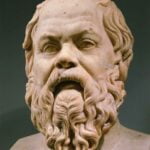Ithaka
C. P. Cavafy, 1863 – 1933
As you set out for Ithaka
hope your road is a long one,
full of adventure, full of discovery.
Laistrygonians, Cyclops,
angry Poseidon—don’t be afraid of them:
you’ll never find things like that on your way
as long as you keep your thoughts raised high,
as long as a rare excitement
stirs your spirit and your body.
Laistrygonians, Cyclops,
wild Poseidon—you won’t encounter them
unless you bring them along inside your soul,
unless your soul sets them up in front of you.
Hope your road is a long one.
May there be many summer mornings when,
with what pleasure, what joy,
you enter harbors you’re seeing for the first time;
may you stop at Phoenician trading stations
to buy fine things,
mother of pearl and coral, amber and ebony,
sensual perfume of every kind—
as many sensual perfumes as you can; and may you visit many Egyptian cities
to learn and go on learning from their scholars.
Keep Ithaka always in your mind.
Arriving there is what you’re destined for.
But don’t hurry the journey at all.
Better if it lasts for years,
so you’re old by the time you reach the island,
wealthy with all you’ve gained on the way,
not expecting Ithaka to make you rich.
Ithaka gave you the marvelous journey.
Without her you wouldn’t have set out.
She has nothing left to give you now.
And if you find her poor, Ithaka won’t have fooled you.
Wise as you will have become, so full of experience,
you’ll have understood by then what these Ithakas mean.
Ιθάκη
Κωνσταντίνος Καβάφης, 1863 – 1933
Σα βγεις στον πηγαιμό για την Ιθάκη,
να εύχεσαι νάναι μακρύς ο δρόμος,
γεμάτος περιπέτειες, γεμάτος γνώσεις.
Τους Λαιστρυγόνας και τους Κύκλωπας,
τον θυμωμένο Ποσειδώνα μη φοβάσαι,
τέτοια στον δρόμο σου ποτέ σου δεν θα βρεις,
αν μέν’ η σκέψις σου υψηλή, αν εκλεκτή
συγκίνησις το πνεύμα και το σώμα σου αγγίζει.
Τους Λαιστρυγόνας και τους Κύκλωπας,
τον άγριο Ποσειδώνα δεν θα συναντήσεις,
αν δεν τους κουβανείς μες στην ψυχή σου,
αν η ψυχή σου δεν τους στήνει εμπρός σου.
Να εύχεσαι νάναι μακρύς ο δρόμος.
Πολλά τα καλοκαιρινά πρωιά να είναι
που με τι ευχαρίστησι, με τι χαρά
θα μπαίνεις σε λιμένας πρωτοειδωμένους·
να σταματήσεις σ’ εμπορεία Φοινικικά,
και τες καλές πραγμάτειες ν’ αποκτήσεις,
σεντέφια και κοράλλια, κεχριμπάρια κ’ έβενους,
και ηδονικά μυρωδικά κάθε λογής,
όσο μπορείς πιο άφθονα ηδονικά μυρωδικά·
σε πόλεις Aιγυπτιακές πολλές να πας,
να μάθεις και να μάθεις απ’ τους σπουδασμένους.
Πάντα στον νου σου νάχεις την Ιθάκη.
Το φθάσιμον εκεί είν’ ο προορισμός σου.
Aλλά μη βιάζεις το ταξείδι διόλου.
Καλλίτερα χρόνια πολλά να διαρκέσει·
και γέρος πια ν’ αράξεις στο νησί,
πλούσιος με όσα κέρδισες στον δρόμο,
μη προσδοκώντας πλούτη να σε δώσει η Ιθάκη.
Η Ιθάκη σ’ έδωσε τ’ ωραίο ταξείδι.
Χωρίς αυτήν δεν θάβγαινες στον δρόμο.
Άλλα δεν έχει να σε δώσει πια.
Κι αν πτωχική την βρεις, η Ιθάκη δεν σε γέλασε.
Έτσι σοφός που έγινες, με τόση πείρα,
ήδη θα το κατάλαβες η Ιθάκες τι σημαίνουν.
(Από τα Ποιήματα 1897-1933, Ίκαρος 1984)
“Ithaka” is the modern version of “Odyssey”, Homer’s ancient Greek epic poem.
Kavafis even includes the same “monsters” in his work: The Cyclops, including one named Polyphemus (aka “Kyklopes”), Laistrygonians and Poseidon the god of the oceans acting monstrously in his petty campaign of revenge against Odysseus for his part in beating Troy, one of Poseidon’s pet cities.
The first hint that Kavafis is interested in the Journey itself, not the Destination, comes with the opening: “As you set out for Ithaka, hope your road is a long one, full of adventure, full of discovery.” Ithaka is the destination in the poem: it is a homecoming. It’s the end of a full circle, a long Journey we call “life”, that is supposed to lead to Salvation.
“Ithaka gave you the marvelous journey. Without her you wouldn’t have set out. She has nothing left to give you now.” So, setting out for a destination, although not the actual target, does start our Journey, and keeps us going.
Many scholars feel that “Ithaka” is a metaphor for death. Once we reach “Ithaka”, “she has nothing left to give you now”. But we have learned and evolved all along the Great Journey, despite the difficulties.
Kavafis broadens the lesson on the long Journey of life at his poem closing, and applies it to understanding all those who have homes they would return to: “And if you find her poor, Ithaka won’t have fooled you. Wise as you will have become, so full of experience, you’ll have understood by then what these Ithakas mean.” Using “Ithakas” (plural) the poet also suggests a sense of original identity. Each one of us has a different Destination, thus a different Journey. However, they are all “Ithakas”, suggesting a Great common element and/or objective of all people.
Life is a Journey, not a destination.
















RECENT COMMENTS